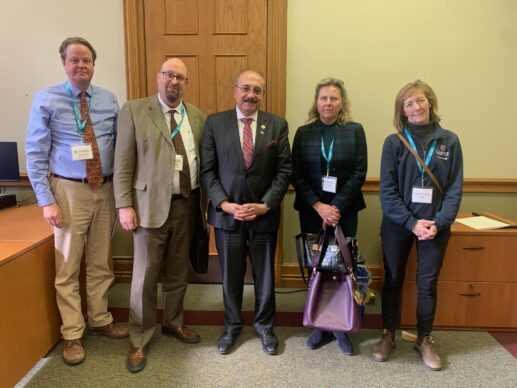TORONTO, February 26, 2024 – The Ontario Confederation of University Faculty Associations says today’s government announcement of nearly $1.3 billion for universities and colleges over the next three years is an inadequate investment in Ontario’s postsecondary institutions.
“The Minister of Colleges and Universities recognizes that we are facing a funding crisis, but the gap between what has been provided and what is needed is massive,” said Nigmendra Narain, President of OCUFA. “This is a one-time drop in the bucket.”
The announced funding is less than half of the amount recommended by the government-appointed Blue-Ribbon Panel. It is almost eight times less than OCUFA’s recommendation for university funding alone over five years to reach Canada’s funding national average, as laid out in its 2024 pre-budget submission.
“The deficits Ontario universities face are due to a manufactured crisis by the province due to chronic underfunding. And this new spending will keep Ontario’s universities dead last in per-student funding compared to every province in the country,” said Jenny Ahn, OCUFA Executive Director. “Ontario should—and must—do better than this to support universities during this time of crisis.”
OCUFA is pleased to see a commitment to freezing tuition fees for domestic students, but noted there is no commitment to more direct funding for universities to make up for the loss in revenue from that freeze.
OCUFA is also glad to see an increase to the Small, Northern and Rural Grant for colleges and Northern Ontario Grant for Universities and investments being made in mental health support for students.
However, OCUFA is alarmed by the province’s direct allocation of funds to private, third-party reviews of postsecondary institutions.
“We have serious concerns that this will function as a $15 million gift to private consulting firms who have no connection or investment in our public postsecondary system,” said Narain. “We need less private intervention and profiting off our public universities, and more provincial investment and direct consultation with faculty and the people who teach and work with students on campuses every day.”
The government’s proposals add unnecessary red tape, too. They will force universities to go through more administrative red tape to provide information to the government that is already available, such as audit data and proof of “efficiencies”—which remain undefined in the announcement. The Minister offered no new funding for universities to comply with another red tape measure.
“The solution to the chronic underfunding of Ontario’s universities is simple: political will to make a true investment in per-student funding to get us up to the Canadian average, not more red tape to measure ‘efficiencies’ when universities are already operating very efficiently,” said Narain. “Ontarians need transparency from the government about where our public money is going, especially in the wake of recent news about donations from private career colleges to the Minister of Colleges and Universities.”
In its 2024 pre-budget submission, OCUFA recommended annual compounded funding increases of 11.75 per cent for five years to reach the national average; changes to the provincial funding formula that incentivize domestic enrolment; reducing red tape; and increasing direct student grant assistance.
“OCUFA and the government’s own Blue-Ribbon Panel both recognize the urgent need for more funding in a sector under crisis. It’s disappointing that the government has ignored its own Blue-Ribbon Panel’s recommendations and OCUFA’s blueprint for a sustainable public university sector,” said Ahn. “Our public universities provide immense economic and cultural value to our communities. We want them to thrive, and we can’t do that if we continue to be forced to do more with less.”
OCUFA and its members will present their vision for a successful and sustainable future for Ontario’s public universities at OCUFA’s annual Advocacy Day at Queen’s Park, scheduled for March 20.
Founded in 1964, OCUFA represents 18,000 faculty, academic librarians, and academic professionals in 31 member organizations across Ontario. It is committed to enhancing the quality of higher education in Ontario and recognizing the outstanding contributions of its members towards creating a world-class university system. For more information, please visit the OCUFA website at www.ocufa.on.ca
-30-
For more information, contact:
Manisha Aggarwal-Schifellite, Communications Lead at media@ocufa.on.ca










